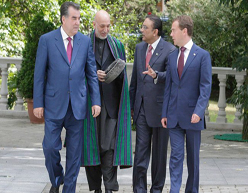Escalating narcotic and terrorism threats dominate quadrilateral summit agenda

MOSCOW, Russia - At a recent quadrilateral summit in the Kremlin, the presidents of Russia, Afghanistan, Pakistan and Tajikistan discussed pressing regional problems and ways of further strengthening ongoing economic cooperation between their countries.
However, the main focus of the attention of Russian President Dmitry Medvedev, Afghan President Hamid Karzai, Pakistani President Asif Ali Zardari and Tajik President Emomali Rakhmon was concentrated on the searches for more effective ways of counteracting the rapidly growing narcotic threat, extremism and terrorism in these countries. “All countries need to join efforts in the fight against all these negative phenomena together, and not separately or isolation,” Medvedev, the host of the one-day summit, noted in his own opening speech.
Besides, all the presidents expressed readiness to activate measures to fight these negative trends in all directions, including the Shanghai Cooperation Organization and the Collective Security Treaty Organization (CSTO).
Russian Foreign Affairs Minister Sergei Lavrov, who took part in the Summit’s expanded session, noted that a special antinarcotics operation, dubbed, “The Channel”, is carried out regularly among the summiteering states under the auspices of the CSTO and is specifically directed at curtailing all forms of illegal circulation of drugs in region. Russia and Tajikistan participate in these operations as full partners, while Pakistan and Afghanistan currently take part only as observers.
Also, all the presidents discussed mutual economic interaction issues, including the ways of further deepening of cooperation in the energy, transportation infrastructure and minerals extraction industries. Yielding to the wishes of the Tajik leadership, the next meeting has been scheduled to take place in Dushanbe, the Tajik capital.












 Web design,
Web design,